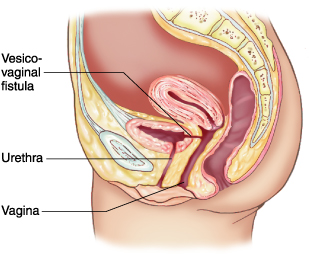An abnormal connection between the urinary tract and the nearby organ occurs most commonly in women in relation to some gynecological / obstetric procedure. Patient has history of either under gone some pelvic surgery or multiple childbirths with cesarean sections.
Post Radiotherapy for cervical cancer ( esp with older techniques) also there is a high chance of VVF, Infection or incontinence is caused are some of the symptoms due to Urinary fistulae. An abnormal connection between the urinary tract and the nearby organ can also be formed during the Urinary Fistulae. Urinary organ or Vagina connections are known as a vaginal fistula. Basically, a fistula is a hole in the vagina, bladder or other organs that allow urine or other matter to pass by where it should not.
The occurrence of urinary fistulas is often due to trauma, surgery, or because of certain diseases. The damage to the bladder during pelvic or abdominal surgeries. In most cases the urinary fistulas have be repaired through surgery, very few heal with conservative management.
Symptoms of urinary fistula
Urinary fistulas are painless normally. People could be aware of the fistula with their symptoms. The symptoms include:
- Constant leakage of urine from vagina
- Feces leaking through vagina (If rectum also involved)
- Passing gas while urinating through the urethra
- Fluid leaking from vagina
- Irritation in the vulva area
- Regular infections in the urinary tract (UTIs)
- Abdominal pain
Causes of Urinary Fistula
The condition of fistula could be caused due to the damage to the tissues in the pelvic region, urinary tract or vagina. Urinary fistulas develop due to infection or due to surgery, accident, and injury or radiation treatment. After the breaking of the tissue over the time, the fistula may open.
Other reasons due to which fistula form are:
- Largely the vesicovaginal fistulas are caused due to Caesarean and Hysterectomy section. Fistula could also be the result of surgery on the perineum, rectum, anus or the back wall of the vagina.
- Malevolence in the pelvic region, such as cervical cancers or colon.
- Diverticulitis or Inflammatory bowel disease. The issue of Fistulas could be normal for people with Colitis or Crohn disease.
- Problems resulting due to episiotomy incision during childbirth, infection or deep tears.
Diagnosis of Urinary Fistulas
The physician will conduct an examination to understand the fistula. A patients medical history will be discussed by the physician to understand the possible cause of fistula. Probably a pelvic examination will be performed by the doctor. Additional tests might be recommended by the physician depending on the precise location of the fistula and to determine the best way of treatment.
Treatment of Urinary Fistula
Fistulas could be treated by conservative therapy however most fistulas require surgery. Some fistulas are able to heal on own. It is possible if the tissue nearby the fistula is healthy and the fistula is small and not damaged by cancer or radiation therapy.
The determination of the type of surgery would depend on the location and type of fistula. Some surgeries are done through the abdomen while some are done through the vagina. In some case, the correction will be done with the robotic surgery that involves precise movements or laparoscopic surgery that uses small incision. Damaged tissue, tumor and other material that affects the fistula will be removed during the surgery. Surgery is conducted to repair the fistula encouraging the growth of healthy tissues and closing of the fistula opening and restoring normal function of the urinary tract and the organs that are affected.


Recent Comments